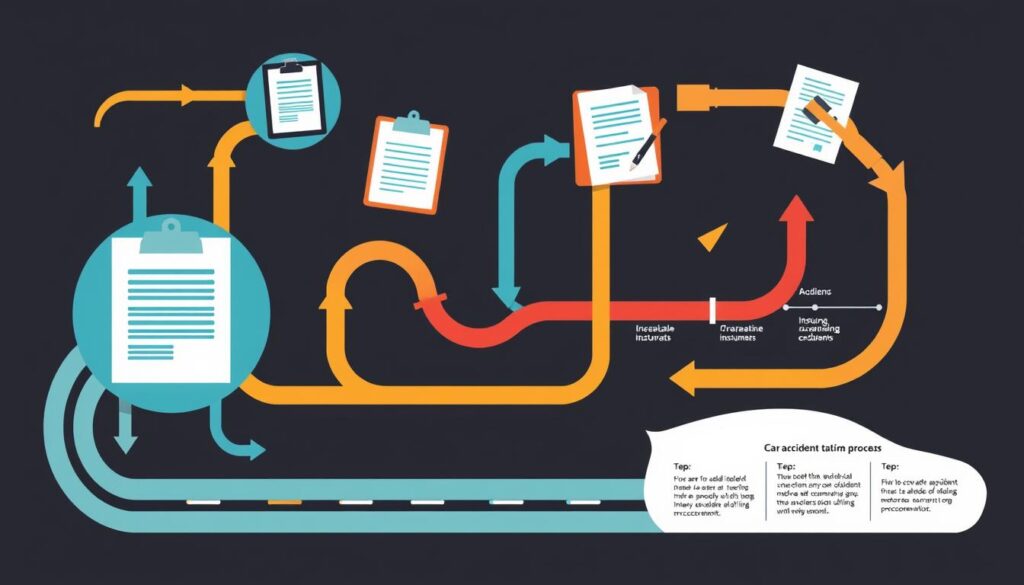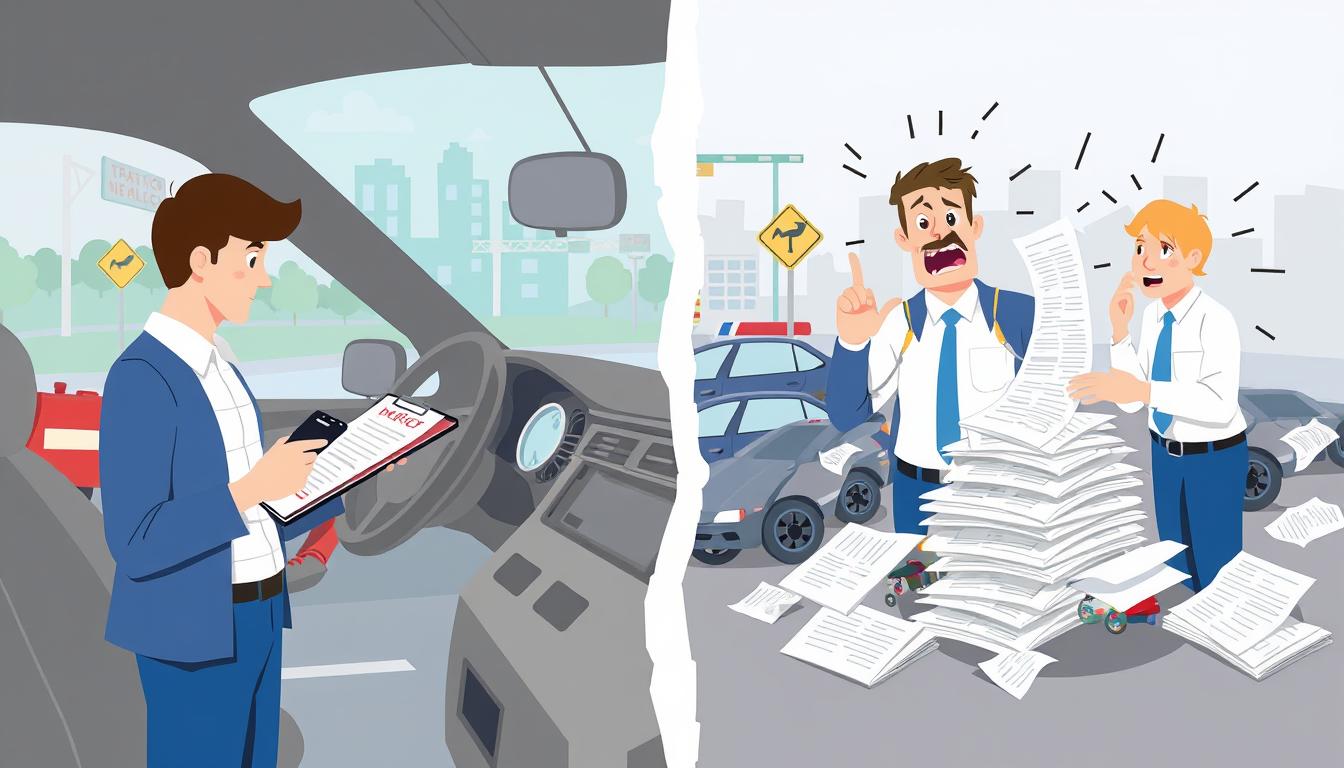Approximately 6 million car accidents occur annually in the United States, underscoring the critical need to grasp the nuances of filing an insurance claim post-accident. The intricacies of car accident claims can be daunting, making it imperative to be well-versed in the process. This knowledge empowers claimants to ensure they receive the compensation they are entitled to. This article aims to provide crucial insurance claim tips, facilitating a smoother journey through the claims process following an auto accident.
Key Takeaways
- Understand your insurance policy details before filing a claim.
- Gather all relevant information promptly after an accident.
- Report the incident to law enforcement and your insurance company.
- Avoid admitting fault at the scene to protect your claim.
- Keep detailed records of expenses and communications.
Understand Your Insurance Policy
Mastering the art of managing a car accident extends beyond mere driving proficiency. It necessitates a deep comprehension of your insurance policy. Such knowledge serves as the bedrock for making judicious decisions regarding coverage and claims.
Review Coverage Details
Initiate by scrutinizing the coverage specifics of your policy. It’s imperative to delve into liability, collision, and comprehensive coverage. Each category offers distinct financial support, underscoring the necessity for thorough understanding. For comprehensive car accident insurance advice, a meticulous review of these elements is indispensable.
Know Your Deductible
Grasping the essence of your deductible is crucial when confronting a claim. This figure represents the initial outlay you must bear before your insurance intervenes. Acquaintance with your deductible is pivotal for setting realistic expectations, thereby aligning with the principles of insurance claim management.
Identify Claim Procedures
Lastly, each insurance entity possesses its unique claim filing protocols. Acquaintance with these procedures is essential for a seamless claim process and to circumvent potential hurdles. Proactive engagement in understanding your insurer’s claim procedures is a critical component of adeptly managing your insurance policy.
Gather Essential Information
Following a car accident, it is imperative to collect crucial data to fortify your insurance claim. Prompt action can profoundly influence the outcome of your case. Documenting the scene accurately is a fundamental step.
Document the Scene
Effective documentation is paramount in any car accident scenario. Start by capturing clear photographs of the involved vehicles from multiple angles. Note the condition of street signs, traffic lights, and weather at the time. Record the accident’s sequence of events, including the exact time and location. These details are essential for solidifying your car accident insurance advice, aiding in clarifying the incident’s circumstances.
Exchange Information with Other Parties
Exchanging information with all parties involved is crucial. Collect names, addresses, phone numbers, and insurance details from other drivers. This information is vital for future interactions with your insurance company, aiding in a clearer understanding of the accident.
Collect Witness Statements
Eyewitness accounts are invaluable when filing your claim. If there are bystanders or other drivers who witnessed the accident, request their contact information and a brief statement. These statements enhance your claim’s strength when presented to your insurer.
Report the Accident Promptly
Experiencing a car wreck necessitates immediate action to protect your rights and facilitate a seamless insurance claim process. Promptly reporting the accident is crucial for effective communication with law enforcement and your insurance provider. This initial step is pivotal in setting the stage for a successful claim resolution.
Notify Law Enforcement
Contacting the police is a fundamental step following a car accident. It is imperative to document the incident officially. An official police report is often required when filing an insurance claim. This report captures essential details such as the location, time, and parties involved.
Inform Your Insurance Company
Following the initial contact with law enforcement, it is imperative to notify your insurance company. Quick communication with your insurer initiates the insurance claim process. Demonstrating a commitment to resolving the issue promptly can expedite the claim’s processing. Timely reporting ensures compliance with legal obligations and keeps your case on track.
Keep Detailed Records
Maintaining thorough records throughout the insurance claim process after an auto accident is vital for a smooth experience. Keeping detailed records allows you to manage your claim effectively and can be advantageous if disputes arise.
Preserve All Communication
One of the car collision insurance claim best practices is to document every communication related to your case. This includes phone calls, emails, and messages exchanged with your insurer, law enforcement, and other parties involved in the accident. By preserving these records, you can refer back to them if necessary and ensure clarity regarding any agreements or statements made.
Log Medical Expenses and Damage
Documenting your medical expenses and damage is crucial to illustrate the extent of your losses. Take note of all related costs, including hospital bills, therapy sessions, and any vehicle repairs. This detailed logging not only reinforces your claim but may also help you maximize the compensation you receive. Remember, the more information you provide, the stronger your case becomes.
Do Not Admit Fault at the Scene
Engagement in a vehicular collision often precipitates an emotional storm. Amidst this turmoil, it is imperative to refrain from admitting fault, regardless of perceived culpability. Acknowledging fault can significantly impede your capacity to secure rightful compensation and jeopardize your insurance claim’s success. Grasping the intricacies of liability claims is essential for adeptly navigating this complex terrain.
Understand Liability Claims
Liability claims hinge on the identification of the accident’s causal party. The evaluation process incorporates elements such as police reports, testimonies from bystanders, and adherence to traffic regulations. The extent of each party’s culpability directly correlates with the compensation they may receive. Prematurely accepting blame can be detrimental, potentially resulting in financial repercussions.
Consult with a Legal Expert
Engaging a legal professional is crucial when ambiguity surrounds fault or liability. They offer indispensable insights into liability claims, ensuring your rights are safeguarded. Legal counsel can elucidate your entitlements, facilitating the maximization of compensation and imparting insurance claim strategies specific to your circumstances.
Communicate Clearly with Your Insurer

Effective communication is vital in navigating the intricate world of insurance claims. In the context of car accidents, mastering the art of communication with your insurer can greatly influence your experience. Honesty and openness about the incident are key to a smooth claim process, adhering to fundamental insurance claim dos and don’ts.
Be Honest and Forthcoming
Offering accurate and comprehensive details about the accident fosters trust with your insurance company. Such transparency is crucial for claim evaluation, reducing the risk of misunderstandings. Adhering to car accident insurance advice, it’s important to note that concealing information or misstating facts can complicate the process or even result in claim denials.
Stick to the Facts
During the claims process, it’s essential to adhere strictly to the facts. Refrain from speculating or making assumptions about the accident’s events. Providing a detailed account of what transpired, backed by supporting documentation, fortifies your claim. A clear, concise narrative of the incident can expedite the claims resolution, ensuring all parties are on the same page. For additional guidance, refer to this resource on insurance claim dos and don’ts.
Know the Deadlines for Filing Claims
Grasping the significance of deadlines can profoundly influence the success of your insurance claim. Each state imposes unique state regulations concerning the timeframes for informing your insurer and submitting required documents. Acquaintance with these deadlines is a critical component of the claims process.
Understand State Regulations
Every state enacts its own legislation regarding the timeframe for filing an insurance claim. These stipulations often dictate the urgency of reporting an accident to your insurer. For instance, some jurisdictions might mandate notification within 30 days, whereas others could extend this to a full year. It is imperative to delve into and know the deadlines for filing claims pertinent to your state to circumvent any potential issues.
Keep Track of Important Dates
Effective organization is paramount in navigating your claim. Maintaining a record of critical dates can act as a valuable resource throughout the journey. Here are some insurance claim tips to assist in staying organized:
- Document the date of the accident.
- Note when you first report the incident to your insurance company.
- Mark deadlines for submitting all required paperwork.
- Set reminders for follow-up actions with both your insurer and any involved parties.
Avoid Common Mistakes
When navigating the process of filing an insurance claim after a car wreck, numerous challenges arise. Grasping what to steer clear of can markedly enhance the likelihood of a claim’s success. It is imperative to recognize and avoid these common pitfalls to effectively manage the insurance claim dos and don’ts.
Don’t Delay in Filing
Timeliness is paramount in the claims process. Postponing the filing of an insurance claim can complicate matters and may even result in its rejection. Insurance entities have stringent deadlines for claims submissions. Prompt action signifies a commitment to the process and can expedite it.
Don’t Inflate Claims
Inflating claims in an attempt to secure a higher settlement is a common error. This approach is not only unethical but can also incur severe penalties, including legal repercussions and claim denials. Presenting damages accurately ensures a smoother claims process and safeguards against potential legal consequences.
Understand the Claims Process

Navigating the insurance claim process after an auto accident can often feel overwhelming. It is vital to understand the claims process to ensure that you are adequately prepared for what lies ahead. Being familiar with assessments and settlements will help you handle interactions more effectively.
Be Prepared for Assessments
Insurance adjusters will likely conduct assessments to determine the extent of damages and injuries. This necessitates having all your documentation ready, including photos, repair estimates, and medical records. A thorough understanding of the insurance claim process after an auto accident allows you to address questions confidently and clarify any uncertainties. Keep in mind that being organized can greatly influence the outcome of your claim.
Settle with Caution
When it comes to accepting a settlement, exercising caution is crucial. Insurers may offer a settlement quickly to close the claim. It’s vital to evaluate whether the proposed amount fully compensates for your losses. If you feel pressured to accept an offer, remember that you can consult professionals who understand the details of the claims process. Patience may lead to a more favorable resolution. Always assess your options and consider external resources by visiting this resource for further insight.
Seek Professional Help When Needed
Filing an insurance claim can often be a complicated process, especially if significant damages are involved. In such cases, it becomes crucial to seek professional help to ensure you achieve a fair settlement. Understanding when to request guidance from legal or insurance experts can make a considerable difference.
Consider Hiring an Attorney
Hiring an attorney for claims can provide valuable support, particularly if your case involves extensive vehicle damage or injuries. Attorneys specializing in insurance matters understand complex regulations and can advocate on your behalf. Their expertise may lead to a more favorable outcome, allowing you to concentrate on recovery while they handle negotiations and communications.
Explore Public Adjusters
Public adjusters are another resource to consider when dealing with an insurance claim. These professionals work on behalf of policyholders, unlike insurance company adjusters. They evaluate damages, gather necessary documentation, and negotiate compensation. Engaging a public adjuster might be particularly beneficial if the claims process feels overwhelming. Utilizing their experience aligns well with effective insurance claim tips you can leverage for a successful claim.
Review the Final Settlement Offer
Receiving a final settlement offer marks a pivotal moment in the car collision insurance claim process. It is imperative to review the final settlement offer with meticulous attention. By dedicating time to analyze terms carefully, one can ensure a comprehensive understanding of the agreement. This diligence is crucial to avoid making decisions that could be detrimental.
Analyze Terms Carefully
The act of scrutinizing the settlement offer’s specifics is not merely procedural; it can profoundly affect your financial outcome. It is vital to consider various elements such as:
- Compensation amounts
- Medical expenses coverage
- Future care needs
Each aspect of the offer necessitates thorough contemplation. Adhering to car collision insurance claim best practices involves recognizing the potential risks of accepting the settlement without thorough examination. It is essential to verify that all pertinent expenses are accounted for and that there are no concealed stipulations.
Don’t Rush to Accept
The inclination to expedite the decision-making process is understandable, yet it can result in suboptimal outcomes. Allow yourself ample time to seek professional advice or utilize available resources to grasp your situation fully. For further guidance, refer to this informative resource. A methodical approach fosters well-informed decisions, preventing hasty choices driven by urgency.
Be Patient Throughout the Process
Filing an insurance claim after a car accident is a complex and time-consuming endeavor. It is crucial to maintain patience throughout this journey. This mindset aids in managing expectations and navigating the claims process effectively.
Anticipate Delays
Delays are inevitable in the claims process. These can stem from various factors, including the availability of necessary documentation or the need for additional investigation by insurers. Anticipating these delays allows for a more resilient approach, facilitating smoother navigation through unexpected obstacles.
Stay Persistent
Proactive engagement can greatly influence the outcome of your claim. It is essential to stay persistent with claims by maintaining regular communication with your insurance company. This ensures that your claim remains a priority and keeps you updated on its progress. An active role in the process can expedite the resolution, ultimately leading to a more favorable outcome.
Learn from the Experience
After navigating the often daunting claims process, it’s crucial to reflect on what transpired. Understanding the details of your insurance claim can transform a stressful situation into a valuable learning opportunity. By evaluating what went well and what could have been handled better, you can gain insights for the future. This reflection can highlight important insurance claim tips that others may overlook, ensuring you’re better prepared for any future incidents.
Reflect on the Claims Process
Reflecting on the claims process allows you to identify not just the challenges faced but also the strategies that worked effectively. This analysis can lead to increased confidence in handling similar situations in the future. For example, did you keep thorough documentation? Was communication with your insurer clear and timely? These reflections serve as key learning points that can enhance the way you approach insurance claims down the line.
Educate Yourself for the Future
Continuous education is essential when it comes to managing insurance matters. The more you know about your coverage and the claims process, the more empowered you become. By taking proactive steps to educate yourself—whether through reading resources, attending workshops, or consulting with insurance experts—you’ll not only learn from the experience but also equip yourself with the knowledge needed to navigate unforeseen challenges effectively. This approach will ultimately pay off in simplifying future claims and ensuring you achieve the best possible outcomes.
